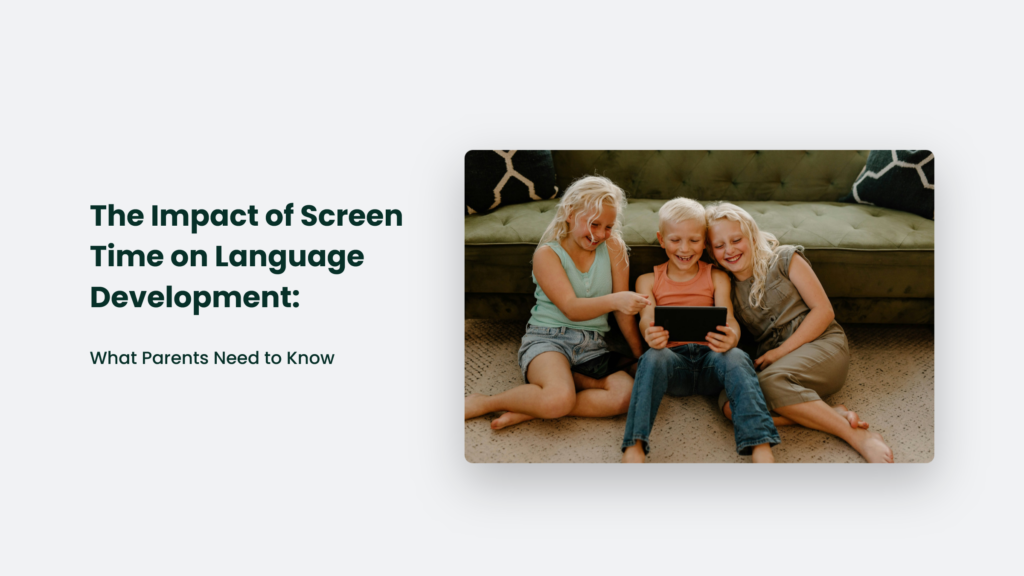In today’s digital age, screens have become integral to our daily lives, including touring children. As parents, educators, and speech-language pathologists at SLCN, we often find ourselves grappling with questions about the effects of screen time on our little ones’ development. One area of particular concern is language development, a crucial skill that forms the foundation for communication, learning, and social interaction.

The Digital Dilemma: Screens and Young Minds
Picture this: A toddler sits transfixed, eyes glued to a tablet as colorful characters dance across the screen. It’s a scene familiar to many parents, offering respite in busy households. But how does this digital engagement impact our children’s budding language skills?
The Growing Prevalence of Screen Time
Recent statistics paint a vivid picture of screen use among young children:
- According to a 2020 study published in JAMA Pediatrics, children aged 3-5 years spend an average of 2.5 hours per day on screens.
- The American Academy of Pediatrics reports that 42% of children aged 0-8 years have their own tablet device.
- A survey by Common Sense Media found that 98% of homes with children under 8 have a mobile device.
These numbers highlight the pervasive nature of screens in our children’s lives, underscoring the importance of understanding their impact on language development.
The Language-Screen Time Connection
How Screen Time Affects Language Acquisition
Research has shown that excessive screen time can have significant effects on language development:
- Reduced Parent-Child Interaction: Screens can limit face-to-face communication, which is crucial for language learning.
- Passive vs. Active Learning: Many passive screen activities lack the interactive element essential for language development.
- Attention and Processing: Fast-paced media can affect a child’s ability to process language effectively.
- Vocabulary Development: While some educational content can introduce new words, excessive screen time may limit real-world vocabulary exposure.
A study published in the journal “Acta Paediatrica” found that children who started watching television before 12 months of age and watched more than two hours per day were six times more likely to have language delays.
The Critical Period of Language Development
The first few years of a child’s life represent a crucial window for language acquisition, often called the “critical period.” During this time, the brain is particularly receptive to linguistic input, making it an optimal period for language learning.
Neuroplasticity and Language Acquisition
Research has shown that the brain’s neuroplasticity is at its peak during early childhood. This heightened plasticity allows for rapid neural connections to form, facilitating efficient language learning. The critical period for language development is generally considered to span from birth to around age 5, with some researchers extending it to age 7.
Impact of Environmental Factors
During this critical period, environmental factors play a significant role in shaping language development. Rich linguistic environments with frequent face-to-face interactions, diverse vocabulary exposure, and responsive communication patterns are crucial for optimal language acquisition.
The Influence of Screen Time on Language Development
The increasing prevalence of screens in children’s lives has raised concerns about their impact on language development during this critical period.
Potential Disruptions to Natural Learning Processes
Excessive screen time during the critical period can potentially disrupt the natural language learning process in several ways:
- Reduced Face-to-Face Interaction: Screens may replace valuable face-to-face interactions essential for language development.
- Passive vs. Active Learning: Many screen activities involve passive consumption rather than active engagement, less beneficial for language acquisition.
- Overstimulation: Rapid-paced media content may overstimulate young brains, making processing and retaining language information difficult.
Balancing Act: The Pros and Cons of Screen Time
Potential Benefits of Controlled Screen Time
When used judiciously, screen time can offer some benefits for language development:
- Introduction to New Concepts and Vocabulary: Quality educational content can expose children to various words and ideas.
- Exposure to Different Accents and Languages: Screen media can provide exposure to linguistic diversity, which can benefit language learning.
- Development of Digital Literacy Skills: As technology becomes increasingly integral to modern life, early exposure can help children develop necessary digital skills.
Drawbacks of Excessive Screen Use
However, the risks associated with overexposure to screens are significant:
- Delayed Speech and Language Skills: Studies have shown a correlation between excessive screen time and language delays in young children.
- Reduced Attention Span: Frequent exposure to fast-paced media may negatively impact attention span and focus.
- Limited Social Interaction Skills: Overreliance on screens can limit opportunities for developing crucial social communication skills.
- Potential Impact on Reading and Writing Abilities: Research suggests excessive screen time may negatively affect literacy development.
Strategies for Healthy Screen Habits
To mitigate the potential negative impacts of screen time on language development, parents and caregivers can implement the following strategies:
- Set Clear Boundaries: Establish and enforce rules about screen time duration and content.
- Prioritise Interactive Screen Time: Choose activities encouraging language use and interaction, such as educational games or video calls with family members.
- Co-Viewing: Watch and engage with children during screen time to enhance learning and promote language use.
- Balance Screen Time with Real-World Experiences: Ensure opportunities for face-to-face interaction, outdoor play, and hands-on learning experiences.
- Be a Role Model: Demonstrate healthy screen habits and prioritise face-to-face communication.
The Role of Speech-Language Pathologists
Speech-language pathologists are crucial in supporting language development in the digital age. They can:
- Assess language skills and identify potential delays related to excessive screen use.
- Provide strategies for enhancing language development at home, including recommendations for appropriate screen use.
- Offer guidance on selecting quality digital content that supports language learning.
- Develop personalised intervention plans for children experiencing language delays.
Looking Ahead: The Future of Screens and Language
As technology continues to evolve, so too will our understanding of its impact on child development. Ongoing research is crucial to inform best practices for screen use among young children. Future studies may focus on:
- Long-term effects of early screen exposure on language development.
- The potential of interactive technologies to support language learning.
- Developing evidence-based guidelines for screen use in different age groups.
Remember, every child is unique, and what works for one may not work for another. If you have concerns about your child’s language development, don’t hesitate to contact professionals like those at SLCN for personalised advice and support.
Frequently Asked Questions:
At what age should I introduce a second language to my child with a speech delay?
There’s no one-size-fits-all answer. Some experts recommend simultaneous bilingualism from birth, while others suggest establishing a strong foundation in one language first. Consult with a speech pathologist for guidance tailored to your child’s needs.
How can I support my child’s bilingual development at home?
Provide consistent exposure to both languages, read books in both languages, engage in language-rich activities, and celebrate your child’s progress in both languages.




